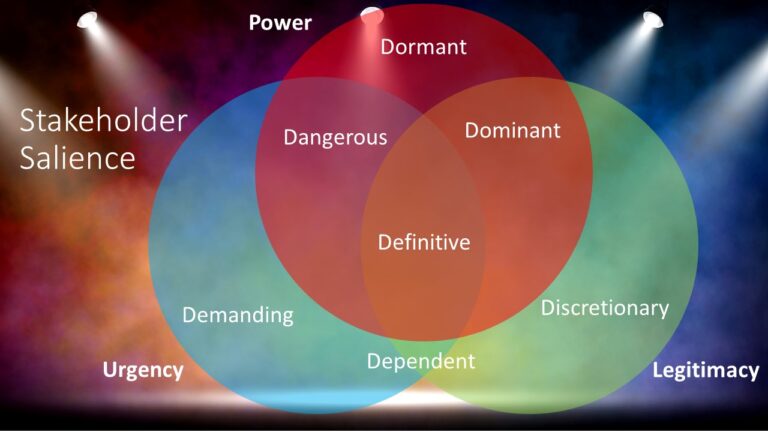
The idea of stakeholders and their importance came from R. Edward Freeman’s book, Strategic Management: A Stakeholder Approach. However, Freeman’s work didn’t include a framework for who or what really counts when it comes to managing stakeholders. In 1997, Ronald Mitchell, Bradley Agle, and Donna Wood published “Towards a Theory of Stakeholder Identification and Salience: Defining the Principle of Who and What Really Counts,” which laid out a framework for how to classify stakeholders. The model identifies three key attributes:
- Power – The ability to get others to act.
- Legitimacy – The generalized perception of concern for the outcomes of the project.
- Urgency – The degree to which there is a call for immediate attention or action.
Stakeholders can have one or more of these constructs – and ideally all of them. Depending on which of these attributes the stakeholder has, they are given different names:
- Definitive (Power, Legitimacy, Urgency) – These stakeholders have all the ideal attributes of a stakeholder and are therefore ideal to interact with.
- Dormant (Power) – These stakeholders have power but are disconnected from the change process and see no sense of urgency.
- Dominant (Power, Legitimacy) – These stakeholders provide inertia to the change project because they’re powerful, but they have no sense of urgency.
- Dangerous (Power, Urgency) – These stakeholders may not legitimately be a part of the project, but they have power and a sense of urgency, which may mean that they interfere with the change project.
- Discretionary (Legitimacy) – These stakeholders are legitimately a part of the project because they’re impacted, but they have no power and no sense of urgency.
- Dependent (Legitimacy, Urgency) – These stakeholders feel the sense of urgency and are legitimately involved but have no power to make the change happen.
- Demanding (Urgency) – With just urgency, these stakeholders are loud about their demands but have no power to request them, and they also have no legitimate connection with the project.
- Non- (none) – Anyone who has no power, legitimacy, or urgency is not a stakeholder at all.
When considering stakeholders, it’s important to understand that different kinds of stakeholders have different roles and risks to the change management project.
